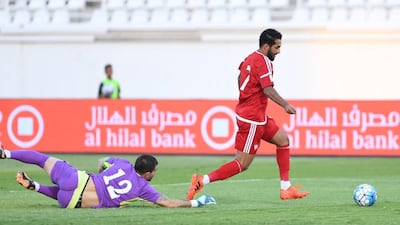The UAE registered their first win under new manager Alberto Zaccheroni on Tuesday, a 1-0 win over Uzbekistan courtesy of Ali Mabkhout's first-half goal. With two games under Zaccheroni's belt, following the single goal defeat to Haiti on Saturday, John McAuley looks at the talking points from the Italian's reign so far.
Getting to grips with 3-4-3
For too long wedded to 4-4-2 during Mahdi Ali’s long tenure, the UAE had become prosaic and predictable. While they enjoyed some significant success, particularly in winning the 2013 Gulf Cup and finishing third at the Asian Cup two years later, it was felt the system had grown outdated, that it was now too easy to combat. Immediately, Zaccheroni has sought to consign that to history, implementing a 3-4-3 system that can revert to five at the back when the team defend. The players have embraced the challenge, although there have been moments this past week confirming they still need time to get used to a new way of playing. It remains very early days in the Zaccheroni era, but initial signs are that they could well be suited to the Italian’s current system of choice.
____________________________________
Read more:
Alberto Zaccheroni's message to UAE players: Treat every friendly as an official match
Walid Abbas: UAE players impressed with early work of new coach Alberto Zaccheroni
Alberto Zaccheroni profile: Loyal and unwilling to conform to Italian stereotype
____________________________________
Plugging the defence
Even though they were defeated by Haiti on Friday, and Uzbekistan created a few openings four days later, the UAE have looked more solid at the back. The decision to deploy three centre-backs provides extra cover, but it also requires more players in the squad for that position. Given injuries and the form of some, the options are not obvious. It is why Khalifa Mubarak’s late call-up was welcome. With three in the middle, much emphasis is placed on the full-backs getting forward to support attack. At the moment, Mahmoud Khamis and Mohammed Fawzi appear the most suitable. Again, though, able replacements are necessary. Considering the system preferred, and the physical toll placed on the widemen, Zaccheroni will need like-for-like understudies.
Amer Abdulrahman’s timely return
Once one of the first names on the teamsheet, Amer Abdulrahman fell out of favour and then form. The Al Ain midfielder was suffering for club and country, no longer the midfield metronome, not any more the man to connect the UAE’s play through their spine. A lengthy injured curtailed his 2016/17 season, and delayed the start of this campaign. But he returned to Al Ain’s line-up and was thus recalled to the national team. Against Uzbekistan, Abdulrahman helped set the tempo, manning the centre of the pitch alongside Khamis Esmail. His touch was sound, his passing precise. Most notably, Abdulrahman linked well with namesake Omar Abdulrahman. The two have always enjoyed a fine understanding, but Amer’s recent problems limited that. It is hugely positive that he seems on the way to overcoming those.
Solutions in attack needed
While the UAE look more organised and, as a result, more compact at the back, they still need to find the best way to maximise their talent up front. As expected, against Haiti they struggled without a spearhead: Ali Mabkhout, Ahmed Khalil and Ismail Matar were out injured. With Mabkhout restored to the tip of the attack against Uzbekistan, the UAE had a natural outlet. He responded by scoring the only goal of the game. Behind him, Omar Abdulrahman flitted in and out, but he continues to find his feet following time on the sidelines, too. While Khalil and Mabkhout were an obvious pair in a 4-4-2, the new formation suggests it will be one or the other up top. Zaccheroni needs to find a solution.
Fresh faces bode well
During Mahdi Ali's reign, one of the main criticisms was that the squad generally picked itself. Players were almost guaranteed their places, irrespective of form or, sometimes, fitness. However, Zaccheroni’s first get-together featured a number of players who could come into the reckoning. Jassim Yaqoub got some serious game-time, with the Al Nasr youngster lively in a front three against Uzbekistan. Ali Salmeen’s inclusion in the squad was well received, while the likes of Khalifa Mubarak, Yousef Saeed and Mohammed Jamal have added a fresh feel, even though only Mubarak got onto the pitch. The talented Khalfan Mubarak, meanwhile, seems set to be entrusted with lightening the creative load on Omar Abdulrahman. On Tuesday, he came on for the UAE No 10. Apparently, the young blood has lifted the mood in the camp.


